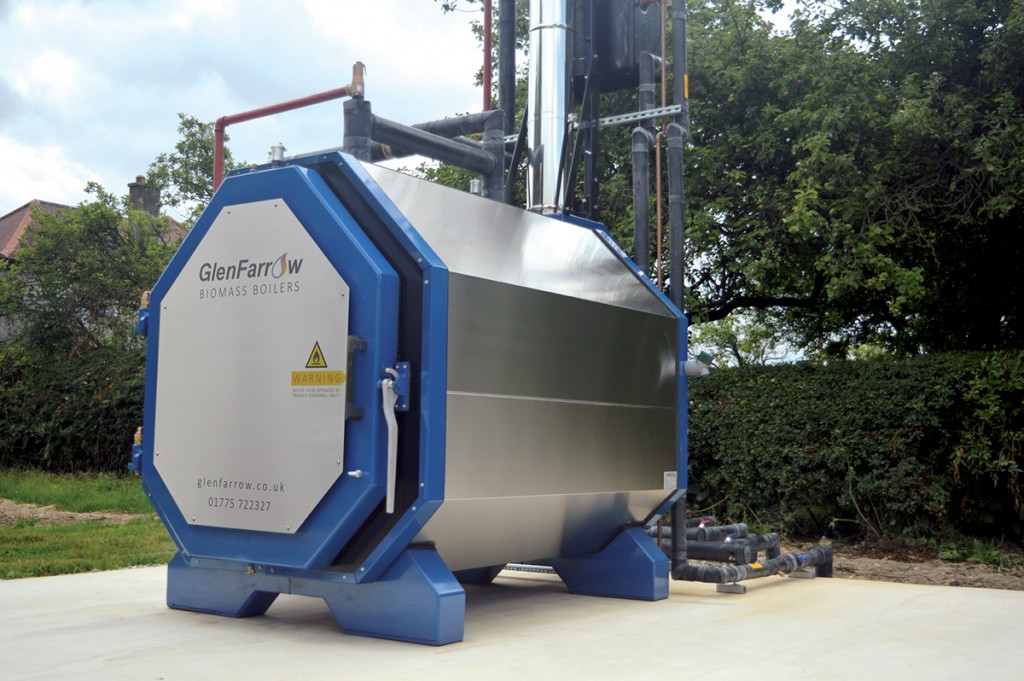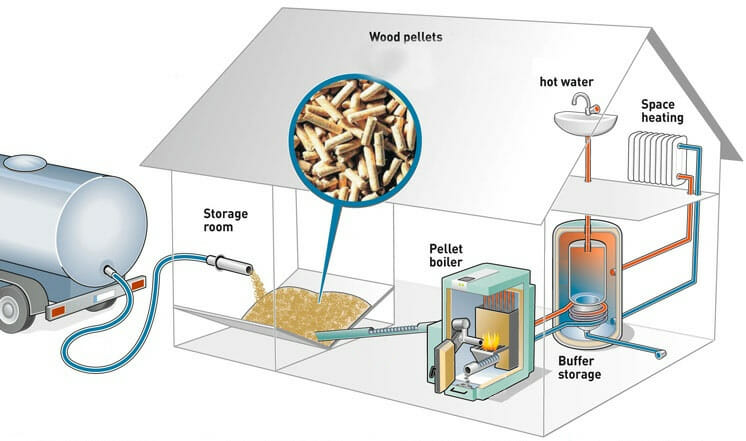Often called wood-fuelled heating systems, biomass boilers burn wood to heat homes and
provide domestic hot water.
Biomass is simply organic matter, such as plants, crop waste and wood products, and
biomass energy is produced from burning these and other forms of biomass. When it comes
to biomass boilers, they generate heat from ‘biomass,’ and they use wood chips, logs or
wood pellets to do so. Although similar to conventional boilers, biomass boilers are a safe
and very environmentally friendly alternative to gas and oil heating systems. A biomass
boiler is a great renewable heating solution for lots of homes, particularly if you live in a
large house or a property that is difficult to heat.

How Do Biomass Boilers Work?
A biomass boiler works by being manually or automatically fed wood chips or pellets from a
hand fill or automatic hopper, which is usually situated next to the boiler. A hopper is like a
storage bin that holds the wood until needed, and the size of hopper you choose will
depend on how much space you have available. Once the hopper feeds the boiler, the wood
is burned in the combustion chamber, which then causes the boiler’s heat exchanger to
transfer heat to the water that is sent to the hot water storage cylinder, and ultimately the
taps and central heating system. The most advanced and efficient biomass boilers are
automatic because they can control the amount of fuel used.
Types of Biomass Fuel
Some homeowners with ready access to wood have a log-fed biomass boiler but wood chip
and pellet-fed biomass boilers seem to be the most popular solutions. Let’s take a closer
look at the three fuel type options to choose from:
Pellets
Considered the most reliable and easy-to-use fuel, wood pellets are the preferred fuel type
for a biomass boiler because they take up less space and require less manual work from the
boiler user. They also have low moisture content and provide excellent efficiency.
Chips
Although cheaper than wood pellets, wood chips require more storage space so they’re
more suited to larger properties. Plus, they are not as efficient and they have a higher
moisture content than wood pellets.
Logs
As the cost of purchasing large quantities of this fuel can be high, a biomass boiler fuelled by
wood logs is generally suited to property owners who have access to an abundant supply of
free wood. Also, the wood logs have to be cut to the correct size, left to dry out and they
can only be fed by hand, which means preparing the wood and feeding the boiler is more
difficult and time-consuming.
Get Free Solar Panels Quotes
Biomass Boiler Prices
Certain factors can influence the price of a biomass boiler, including the boiler size, the
manufacturer and whether it’s a manually or automatically-fed boiler. However, we can tell
you that the cost of a biomass boiler can range from around £5,000 to £21,000, and that
does include the installation cost.
The initial cost may seem high but you should see a healthy return on your investment
provided you choose wisely. You should also know that you could benefit from the
Renewable Heat Incentive (RHI) if you have a biomass boiler installed. The RHI is a UK
government financial incentive scheme that lets you recover some of the initial investment
cost. If you apply and are eligible for domestic RHI, you’ll receive quarterly payments over 7
years in return for the amount of renewable heat produced by the boiler.
It’s worth mentioning that automatic biomass boilers are more expensive than manual-
based systems but an automatically-fed boiler does make life easier. You also need to
consider the ongoing cost of fuel and think about where you will store your wood chips,
pellets or logs. If you have plenty of space available for fuel, you’ll be better off purchasing
wood in bulk to save on fuel and delivery costs.
Check out the table below to compare biomass fuel prices, as well as the price per kWh.

| FUEL TYPE | FUEL PRICE PER TONNE | PRICE PER kWh |
|---|---|---|
| Wood Chips | £80 | 3.6 pence |
| Wood Pellets | £200 | 5.5 pence |
| Logs | £220 | 8.2 pence |
During the first 12 months, a domestic biomass boiler will typically cost you £12,000 to
£15,000 including the price of the boiler, installation and fuel. As prices vary, we
recommend you request quotes from different suppliers before making a final decision.
Biomass Boiler Installation
Biomass boilers tend to be larger than typical gas central heating boilers, plus they require
extra space for fuel storage. You may find that a biomass boiler will fit neatly into the same
space where your existing boiler is installed, provided there is a big enough fuel storage area
near the boiler. As the fuel (wood chips, pellets or logs) need to be kept dry, the storage
area should be undercover or indoors. The boiler also needs a flue or chimney that is
designed for wood fuel, and a lorry must be able to gain access to your property so that you
can accept wood fuel deliveries.

Biomass Boiler Maintenance
A biomass boiler will require regular maintenance, no matter the fuel type and regardless of
whether you choose a manually or automatically-fed system. It is recommended that you
have the boiler serviced once every year to ensure it’s running safely and at peak
performance. An annual service will also help to maintain efficiency and minimise the risk of
breakdowns. As all components of the boiler need to be inspected and maintained, you
should always ask a certified biomass boiler installer to carry out an annual service. The cost
of a biomass boiler service will depend on the size and model, but you can expect to pay
anything between £190 and £520.
It is worthwhile noting that you must empty the ash bin/draw of the boiler regularly unless
it has an automatic ash removal function. If the ash is left to build up for too long, the boiler
will stop working. You can use the ashes from a biomass boiler as compost or you can
arrange for a supplier or waste contractor to dispose of the ash for you.
Get Free Solar Panels Quotes
Advantages of a Biomass Boiler
There are several advantages to installing a biomass boiler over a conventional gas boiler,
such as:
- Environmentally friendly energy source
As biomass is a sustainable and carbon-neutral fuel, it is considered environmentally
friendly. So, if you’re environmentally conscious, installing a biomass boiler can help
you to lower your carbon footprint. - Reduce waste going to landfill
In addition to supplying you with energy, using biomass fuel for your biomass boiler
is a fantastic way to use up waste wood that would otherwise end up in landfill. If
you’re lucky enough to have your own free wood supply, your biomass boiler will be
even more sustainable. - Ideal for off-grid properties
If you live off-grid and are not connected to utilities, a biomass boiler is a great
solution for providing heating and hot water for the home. - Cheaper running costs
The running costs of biomass boilers are usually cheaper compared to other systems,
such as gas or oil boilers. You can save even more money if you source wood fuel
from a local supplier or even eliminate fuel costs if you have access to free wood. - Qualify for the Renewable Heat Incentive (RHI) Scheme
By installing a biomass boiler, you could be eligible for the UK government’s RHI
scheme, which means you can make substantial earnings over the years.
Disadvantages of a Biomass Boiler
As with any heating system, a biomass boiler does have its disadvantages, which include:
- Upfront cost can be expensive
There’s no getting away from the fact it is not cheap to install a biomass boiler but it
is definitely worth considering as it can save you money in the long run. Not
forgetting that the Renewable Heat Incentive helps you to recover the initial costs,
so a biomass boiler should provide a healthy return. - Requires more storage space
Biomass boilers take up more space than other boilers, so they won’t be suitable for
every property. On top of that, a hopper needs to be situated near the boiler and
you’ll have to find a dry space to store the fuel. - Wood fuel delivery lorry needs access to your property
Unless you have a free supply of wood, biomass fuel is usually delivered by a lorry,
meaning access is essential.